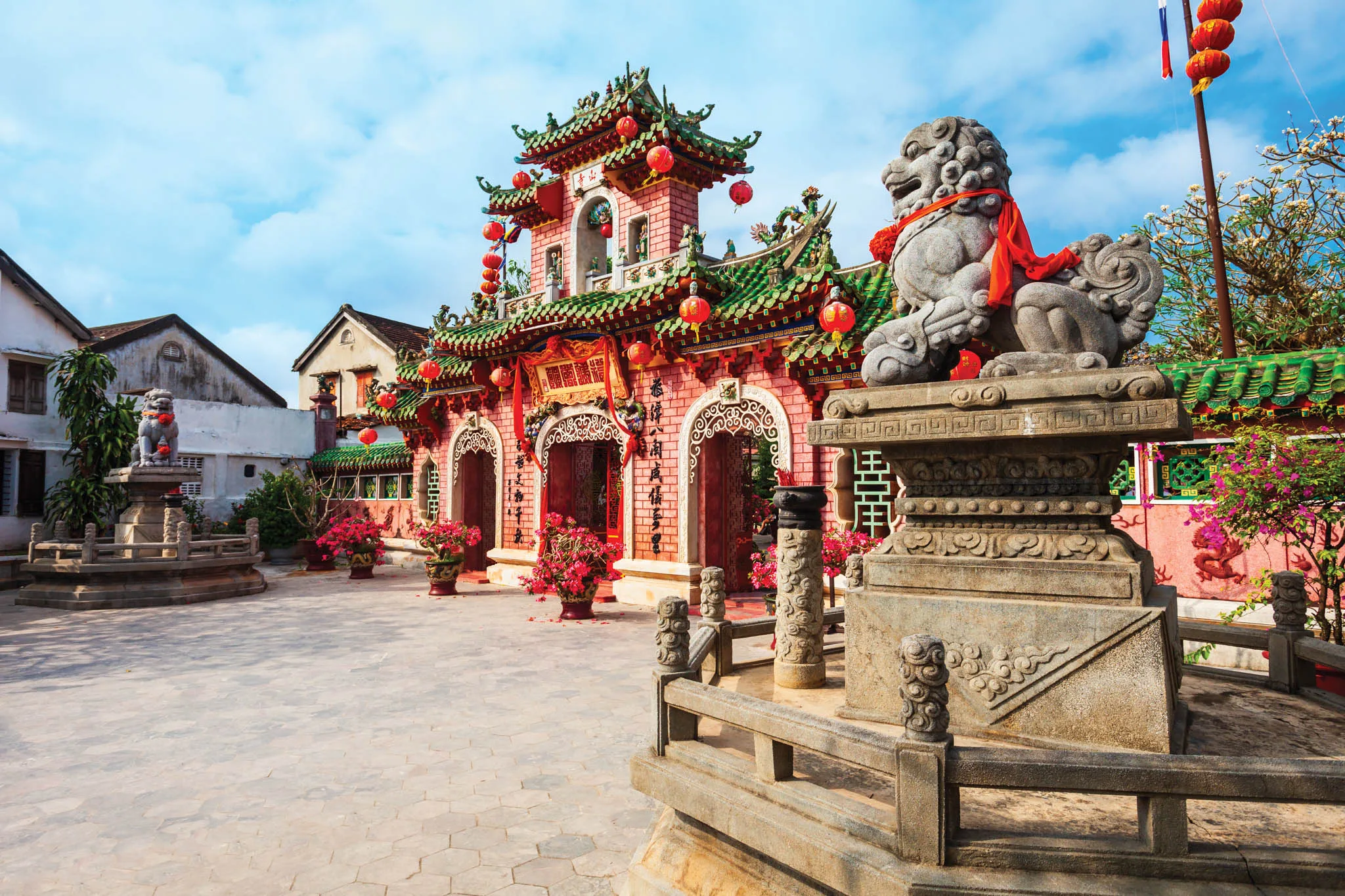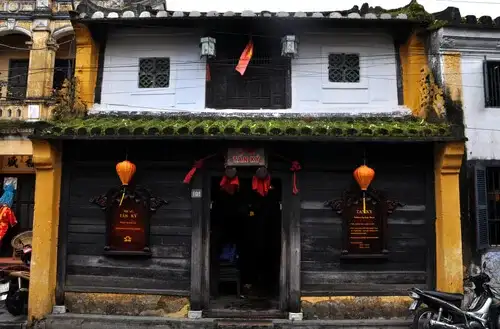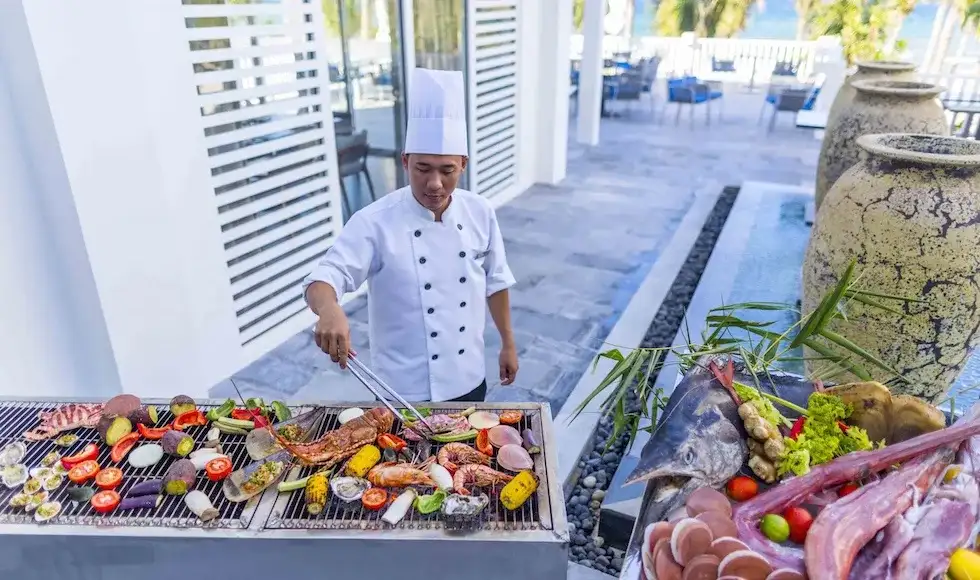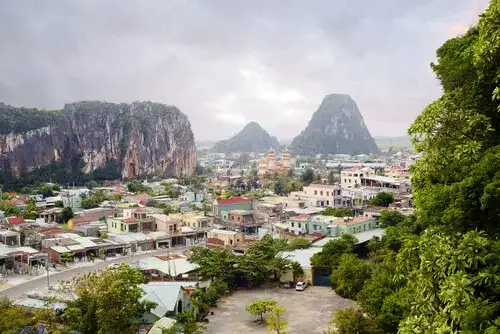Da Nang is central Vietnam’s largest city and is home to some extremely picturesque sites including the Ngu Hanh Son (Five Element Marble Mountains) which lie close to the sea and have caves and pagodas, and Da Nang Beach which stretches for several kilometres between Monkey Mountain and Marble Mountain.
The city of Da Nang is surrounded by the three UNESCO World Cultural Heritage Sites of Hoi An, Hue and My Son.
Thirty-two kilometres south-east of Da Nang is the ancient town of Hoi An, an important international port from the 17th to 19th centuries and now Vietnam’s most popular destination beyond Hanoi and Saigon. Its combination of charming heritage streets and riverside setting, bustling markets, Chinese assembly halls, Japanese remnants, quaint restaurants and cafes, and local tailors and handicraft outlets, have made it a must-see for visitors to Vietnam. It is also a rapidly developing beach resort, with a huge stretch of beach just five kilometres from the town and many modern resorts.
Outside Hoi An is My Son Sanctuary, the capital of the kingdom of Champa from the 5th to 12th centuries. From here, there’s a great view of Champa from the Mountain Church (Nha Tho Nui) which is on top of Buu Chau Hill in the town of Tra Kieu.
Hue, located approximately a 2.5 hour drive north of Da Nang, is widely regarded as the most beautiful city in Vietnam. Hue is situated alongside a large, deep river adjacent to a mountain range. Traditionally Hue was one of the country’s cultural, religious and educational centres, and was also Vietnam’s capital from the years 1802 to 1945. The city of Hue is known worldwide as an architectural treasure with palaces, royal tombs and mausoleums, pagodas, and temples all framed by the natural landscape on either side of the Huong (Perfume) River. The ruins of its huge, moated citadel contains many interesting sites, such as the Nine Holy Cannons, the Imperial Enclosure, the Palace of Supreme Harmony and the Halls of the Mandarins, although the Emperor’s Getaway, the Purple Forbidden City, was largely destroyed during the wars. The Royal Tombs are 15 kilometres south of Hue. One of Vietnam’s best beaches, Thuan An is just 13 kilometres north-east of Hue, and from here visitors can take sampan trips up the Perfume River. From Hue, tourists can go by car to visit the Ho Chi Minh Trail and the remarkable tunnels of Vinh Moc, used during the wars.
The Hai Van Pass divides North and South Vietnam. A 21 kilometre-long road over Hai Van Pass, opened at the end of the 19th century, winds back and forth to a height of 435 metres above sea level. Its name means ‘Pass of the Ocean Clouds,’ since the peak of the mountain is in the clouds while its foot is close to the sea. Hai Van is considered to be the largest frontier post in Vietnam From the top of the pass, one can admire Lang Co Beach to the north and Da Nang to the south. The curving railway through Hai Van Pass is 3200 metres long with sections running through seven tunnels. There are endless forests to the west of the pass and the ocean is to the east. Hai Van Pass is a real challenge for drivers, as well as for adventurers.
Dalat located in the Central Highlands region is renown for its relaxing, natural verdant environment. A popular tourist destination, it is probably one of Vietnam’s best-known vacation sites and is a popular honeymoon mecca. The many sites include Emperor Bao Dai’s Summer Palace and the colourful fresh food and flower markets. Picturesque crumbling French Villas from the 1930s dot the surrounding hillsides.
Nha Trang is on the south central coast of Vietnam and arguably boasts the best beach in the country. Its turquoise waters are perfect for swimming and boat trips are available to interesting offshore fishing villages and islands including Monkey Island with diving options also available.





